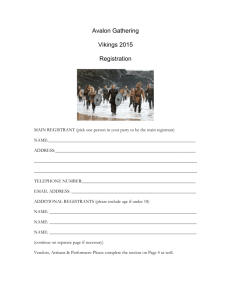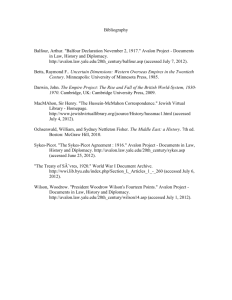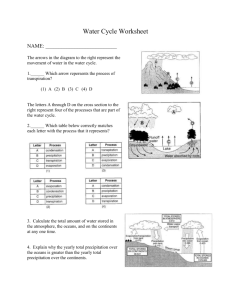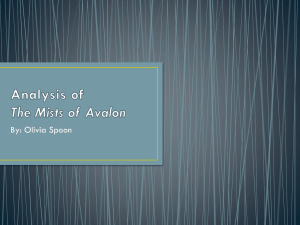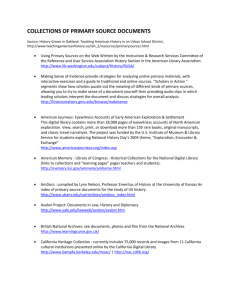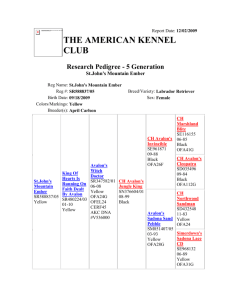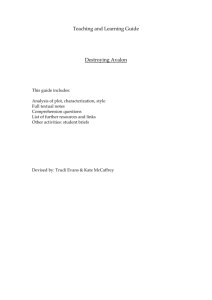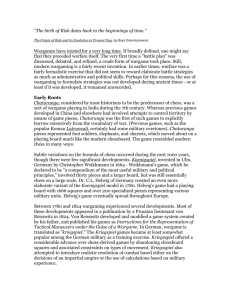Louise Erdrich, “The Leap”
advertisement
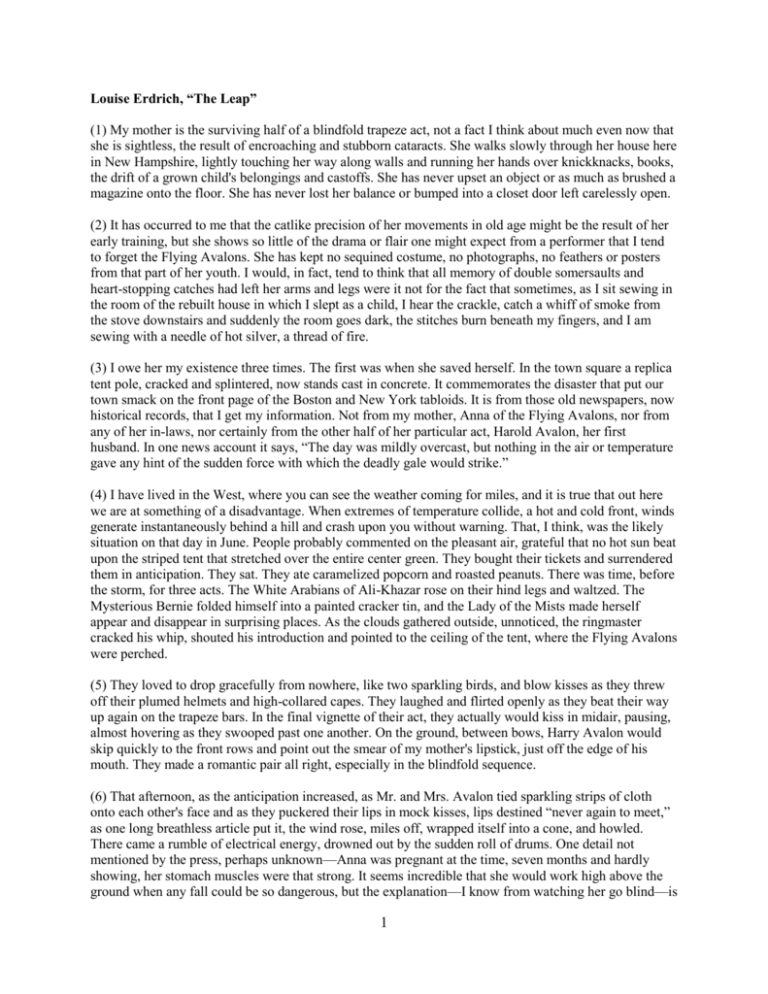
Louise Erdrich, “The Leap” (1) My mother is the surviving half of a blindfold trapeze act, not a fact I think about much even now that she is sightless, the result of encroaching and stubborn cataracts. She walks slowly through her house here in New Hampshire, lightly touching her way along walls and running her hands over knickknacks, books, the drift of a grown child's belongings and castoffs. She has never upset an object or as much as brushed a magazine onto the floor. She has never lost her balance or bumped into a closet door left carelessly open. (2) It has occurred to me that the catlike precision of her movements in old age might be the result of her early training, but she shows so little of the drama or flair one might expect from a performer that I tend to forget the Flying Avalons. She has kept no sequined costume, no photographs, no feathers or posters from that part of her youth. I would, in fact, tend to think that all memory of double somersaults and heart-stopping catches had left her arms and legs were it not for the fact that sometimes, as I sit sewing in the room of the rebuilt house in which I slept as a child, I hear the crackle, catch a whiff of smoke from the stove downstairs and suddenly the room goes dark, the stitches burn beneath my fingers, and I am sewing with a needle of hot silver, a thread of fire. (3) I owe her my existence three times. The first was when she saved herself. In the town square a replica tent pole, cracked and splintered, now stands cast in concrete. It commemorates the disaster that put our town smack on the front page of the Boston and New York tabloids. It is from those old newspapers, now historical records, that I get my information. Not from my mother, Anna of the Flying Avalons, nor from any of her in-laws, nor certainly from the other half of her particular act, Harold Avalon, her first husband. In one news account it says, “The day was mildly overcast, but nothing in the air or temperature gave any hint of the sudden force with which the deadly gale would strike.” (4) I have lived in the West, where you can see the weather coming for miles, and it is true that out here we are at something of a disadvantage. When extremes of temperature collide, a hot and cold front, winds generate instantaneously behind a hill and crash upon you without warning. That, I think, was the likely situation on that day in June. People probably commented on the pleasant air, grateful that no hot sun beat upon the striped tent that stretched over the entire center green. They bought their tickets and surrendered them in anticipation. They sat. They ate caramelized popcorn and roasted peanuts. There was time, before the storm, for three acts. The White Arabians of Ali-Khazar rose on their hind legs and waltzed. The Mysterious Bernie folded himself into a painted cracker tin, and the Lady of the Mists made herself appear and disappear in surprising places. As the clouds gathered outside, unnoticed, the ringmaster cracked his whip, shouted his introduction and pointed to the ceiling of the tent, where the Flying Avalons were perched. (5) They loved to drop gracefully from nowhere, like two sparkling birds, and blow kisses as they threw off their plumed helmets and high-collared capes. They laughed and flirted openly as they beat their way up again on the trapeze bars. In the final vignette of their act, they actually would kiss in midair, pausing, almost hovering as they swooped past one another. On the ground, between bows, Harry Avalon would skip quickly to the front rows and point out the smear of my mother's lipstick, just off the edge of his mouth. They made a romantic pair all right, especially in the blindfold sequence. (6) That afternoon, as the anticipation increased, as Mr. and Mrs. Avalon tied sparkling strips of cloth onto each other's face and as they puckered their lips in mock kisses, lips destined “never again to meet,” as one long breathless article put it, the wind rose, miles off, wrapped itself into a cone, and howled. There came a rumble of electrical energy, drowned out by the sudden roll of drums. One detail not mentioned by the press, perhaps unknown—Anna was pregnant at the time, seven months and hardly showing, her stomach muscles were that strong. It seems incredible that she would work high above the ground when any fall could be so dangerous, but the explanation—I know from watching her go blind—is 1 that my mother lives comfortably in extreme elements. She is one with the constant dark now, just as the air was her home, familiar to her, safe, before the storm that afternoon. (7) From opposite ends of the tent they waved, blind and smiling, to the crowd below. The ringmaster removed his hat and called for silence, so that the two above could concentrate. They rubbed their hands in chalky powder, then Harry launched himself and swung, once, twice, in huge calibrated beats across space. He hung from his knees and on the third swing stretched wide his arms, held his hands out to receive his pregnant wife as she dove from her shining bar. (8) It was while the two were in midair, their hands about to meet, that lightning struck the main pole and sizzled down the guy wires, filling the air with a blue radiance that Harry Avalon must certainly have seen through the cloth of his blindfold as the tent buckled and the edifice toppled him forward, the swing continuing and not returning in its sweep, and Harry going down, down into the crowd with his last thought, perhaps, just a prickle of surprise at his empty hands. (9) My mother once said that I'd be amazed at how many things a person can do within the act of falling. Perhaps, at the time, she was teaching me to dive off a board at the town pool, for I associate the idea with midair somersaults. But I also think she meant that even in that awful doomed second one could think, for she certainly did. When her hands did not meet her husband's, my mother tore her blindfold away. As he swept past her on the wrong side, she could have grasped his ankle, the toe-end of his tights, and gone down clutching him. Instead, she changed direction. Her body twisted toward a heavy wire and she managed to hang on to the braided metal, still hot from the lightning strike. Her palms were burned so terribly that once healed they bore no lines, only the blank scar tissue of a quieter future. She was lowered, gently, to the sawdust ring just underneath the dome of the canvas roof, which did not entirely settle but was held up on one end and jabbed through, torn, and still on fire in places from the giant spark, though rain and men's jackets soon put that out. (10) Three people died, but except for her hands my mother was not seriously harmed until an overeager rescuer broke her arm in extricating her and also, in the process, collapsed a portion of the tent bearing a huge buckle that knocked her unconscious. She was taken to the town hospital, and there she must have hemorrhaged, for they kept her confined to her bed, a month and a half before her baby was born without life. (11) Harry Avalon had wanted to be buried in the circus cemetery next to the original Avalon, his uncle, so she sent him back with his brothers. The child, however, is buried around the corner, beyond this house and just down the highway. Sometimes I used to walk there just to sit. She was a girl, but I rarely thought of her as a sister or even as a separate person really. I suppose you could call it the egocentrism of a child, of all young children, but I considered her a less finished version of myself. (12) When the snow falls, throwing shadows among the stones, I can easily pick hers out from the road, for it is bigger than the others and in the shape of a lamb at rest, its legs curled beneath. The carved lamb looms larger as the years pass, though it is probably only my eyes, the vision shifting, as what is close to me blurs and distances sharpen. In odd moments, I think it is the edge drawing near, the edge of everything, the unseen horizon we do not really speak of in the eastern woods. And it also seems to me, although this is probably an idle fantasy, that the statue is growing more sharply etched, as if, instead of weathering itself into a porous mass, it is hardening on the hillside with each snowfall, perfecting itself. (13) It was during her confinement in the hospital that my mother met my father. He was called in to look at the set of her arm, which was complicated. He stayed, sitting at her bedside, for he was something of an armchair traveler and had spent his war quietly, at an air force training grounds, where he became a specialist in arms and legs broken during parachute training exercises. Anna Avalon had been to many of 2 the places he longed to visit—Venice, Rome, Mexico, all through France and Spain. She had no family of her own and was taken in by the Avalons, trained to perform from a very young age. They toured Europe before the war, then based themselves in New York. She was illiterate. (14) It was in the hospital that she finally learned to read and write, as a way of overcoming the boredom and depression of those weeks, and it was my father who insisted on teaching her. In return for stories of' her adventures, he graded her first exercises. He bought her her first book, and over her hold letters, which the pale guides of the penmanship pads could not contain, they fell in love. (15) I wonder if my father calculated the exchange offered: one form of flying for another. For after that, and for as long as I can remember, my mother has never been without a book. Until now, that is, and it remains the greatest difficulty of her blindness. Since my father's recent death, there is no one to read to her, which is why I returned, in fact, from my failed life where the land is flat. I came home to read to my mother, to read out loud, read long into the dark if I must, to read all night. (16) Once my father and mother married, they moved onto the old farm he had inherited but didn't care much for. Though he'd been thinking of moving to a larger city, he settled down and broadened his practice in this valley. It still seems odd to me, when they could have gone anywhere else, that they chose to stay in the town where the disaster had occurred, and which my father in the first place had found so constricting. It was my mother who insisted upon it, after her child did not survive. And then, too, she loved the sagging farmhouse with its scrap of what was left of a vast acreage of woods and hidden hay fields that stretched to the game park. (17) I owe my existence, the second time then, to the two of them and the hospital that brought them together. That is the debt we take for granted since none of us asks for life. It is only once we have it that we hang on so dearly. (18) I was seven the year the house caught fire, probably from standing ash. It can rekindle, and my father, forgetful around the house and perpetually exhausted from night hours on call, often emptied what he thought were ashes from cold stoves into wooden or cardboard containers. The fire could have started from a flaming box, or perhaps a buildup of creosote inside the chimney was the culprit. it started right around the stove, and the heart of the house was gutted. The baby-sitter, fallen asleep in my father's den on the first floor, woke to find the stairway to my upstairs room cut off by flames. She used the phone, then ran outside to stand beneath my window. (19) When my parents arrived, the town volunteers had drawn water from the fire pond and were spraying the outside of the house, preparing to go inside after me, not knowing at the time that there was only one staircase and that it was lost. On the other side of the house, the superannuated extension ladder broke in half. Perhaps the clatter of it falling against the walls woke me, for I'd been asleep up to that point. (20) As soon as I awakened, in the small room that I now use for sewing, I smelled the smoke. I followed things by the letter then, was good at memorizing instructions, and so I did exactly what was taught in the second-grade home fire drill. I got up, I touched the back of my door before opening it. Finding it hot, I left it closed and stuffed my rolled-up rug beneath the crack. I did not hide under my bed or crawl into my closet. I put on my flannel robe, and then I sat down to wait. (21) Outside, my mother stood below my dark window and saw clearly that there was no rescue. Flames had pierced one side wall, and the glare of the fire lighted the massive limbs and trunk of the vigorous old elm that had probably been planted the year the house was built, a hundred years ago at least. No leaf touched the wall, and just one thin branch scraped the roof. From below, it looked as though even a 3 squirrel would have had trouble jumping from the tree onto the house, for the breadth of that small branch was no bigger than my mother's wrist. (22) Standing there, beside Father, who was preparing to rush back around to the front of the house, my mother asked him to unzip her dress. When he wouldn't be bothered, she made him understand. He couldn't make his hands work, so she finally tore it off and stood there in her pearls and stockings. She directed one of the men to lean the broken half of the extension ladder up against the trunk of the tree. In surprise, he complied. She ascended. She vanished. Then she could be seen among the leafless branches of late November as she made her way up and, along her stomach, inched the length of a bough that curved above the branch that brushed the roof. (23) Once there, swaying, she stood and balanced. There were plenty of people in the crowd and many who still remember, or think they do, my mother's leap through the ice-dark air toward that thinnest extension, and how she broke the branch falling so that it cracked in her hands, cracked louder than the flames as she vaulted with it toward the edge of the roof, and how it hurtled down end over end without her, and their eyes went up, again, to see where she had flown. (24) I didn't see her leap through air, only heard the sudden thump and looked out my window. She was hanging by the backs of her heels from the new gutter we had put in that year, and she was smiling. I was not surprised to see her, she was so matter-of-fact. She tapped on the window. I remember how she did it, too. It was the friendliest tap, a bit tentative, as if she was afraid she had arrived too early at a friend's house. Then she gestured at the latch, and when I opened the window she told me to raise it wider and prop it up with the stick so it wouldn't crush her fingers. She swung down, caught the ledge, and crawled through the opening. Once she was in my room, I realized she had on only underclothing, a bra of the heavy stitched cotton women used to wear and step-in, lace-trimmed drawers. I remember feeling lightheaded, of course, terribly relieved, and then embarrassed for her to be seen by the crowd undressed. I was still embarrassed as we flew out the window, toward earth, me in her lap, her toes pointed as we skimmed toward the painted target of the fire fighter's net. (25) I know that she's right. I knew it even then. As you fall there is time to think. Curled as I was, against her stomach, I was not startled by the cries of the crowd or the looming faces. The wind roared and heat its hot breath at our back, the flames whistled. I slowly wondered what would happen if we missed the circle or bounced out of it. Then I wrapped my hands around my mother's hands. I felt the brush of her lips and heard the beat of her heart in my ears, loud as thunder, long as the roll of drums. 4
